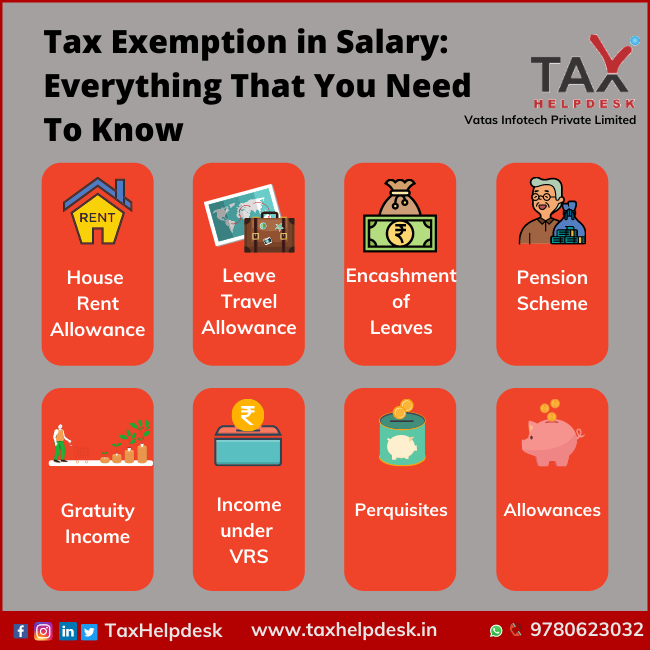The Income Tax Act allows various Income Tax exemption that can help you in saving your taxes. In addition to this, the new Financial Year has just begun, so it is advisable to take care of all of these tax exemptions.
Why should you know about income tax exemption?
A salaried employee has to inform his employer about the tax exemptions that he is claiming. This is so because the employer will calculate the employee’s tax liability after deducting these tax exemptions. Further, TDS on such salary is deducted.
Also Read: Income Tax Slabs under Old & New Tax Regime
List of Income Tax Exemptions for salaried individuals
House Rent Allowance: Most Important Tax Exemption
The employer gives HRA or House Rent Allowance to meet the expenses on accommodation by his employees. Additionally, HRA is a tax exemption under Section 10(13) of the Income Tax Act. This allowance is one of the important tax exemption which saves employee from a part of income tax liability.
Also Read: Can you claim HRA even if own a house?
Leave Travel Allowance (LTA)
There are cases where employer gives allowances to its employees to go on a vacation. This allowance is known as the Leave Travel Allowance. Furthermore, this amount is tax free under Section 10(5) of the Income Tax Act.
The tax exemption of LTA is possible only if:
– The employee actually goes on a vacation and submit bills to its employer
– He goes on a leave within any place in India
– Such person can go on place in India after retirement from service or termination of the service.
Also Read: Best Ways to Save Taxes in 2022
Note:
In addition to the above the points, the salaried individual must note that he can claim LTA tax exemption in respect of any 2 journeys in a block of 4 years.
Encashment of Leaves
In contrast to the above point, if the employee do not go on leave, then the employer may give him the option of encashing these leaves. This is called encashment of leaves and is a tax exemption under Section 10(10AA) of the Income Tax Act. Having stated that, the exemption on leave encashment is different for Government Employees and Other Employees.
Pension Income
Apart from claiming deductions under Section 80CCD(1b), the salaried individual can also claim tax exemption on pension income. However, whether the pension is commuted or uncommuted determines the amount of tax exemption.
Gratuity Income
Gratuity is a retirement benefit to the salaried individual who has rendered services to his employer. As a result of such service, this gratuity is an income tax exemption. Additionally, the receiver of gratuity amount can be either
– Employee himself at the time of his retirement, or
– Legal heir at the time of the death of the employee.
Also Read: New Rules Related to Employee Provident Fund Scheme
Income Received under Voluntary Retirement Scheme
There are certain cases where the employee takes retirement before the actual age of retirement. In such cases also, the employer sometimes give money to the employee. Therefore, such a money is an income under Voluntary Retirement Scheme and is also an tax exemption under Section 10(10C) of the Income Tax Act. However, one must note that the maximum limit of tax exemption under VRS is Rs. 5 lacs.
Perquisites & allowances
Some employers even provide certain perquisites to its employees. These perquisites can be car, mobiles, rent free accommodation, children education fees, food etc. All these perquisites are tax exemption but the quantum varies.
Also Read: Special Allowances under the Income Tax
If you still have doubts regarding income tax exemption, then drop a message below in the comment box or DM us on Whatsapp, Facebook, Instagram, LinkedIn and Twitter. For more updates on tax, financial and legal matters, join our group on WhatsApp and Telegram!
Disclaimer: The views are personal of the author and TaxHelpdesk shall not be held liable for any matter whatsoever!


